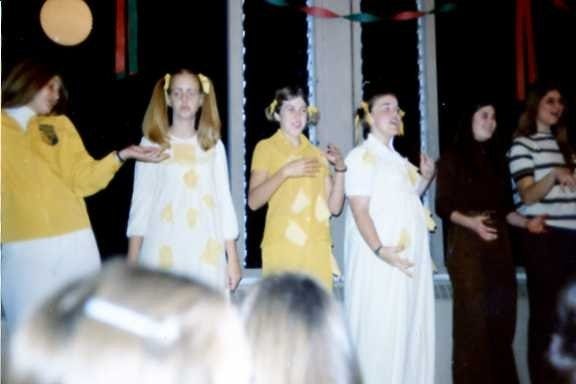Knowing How to Ground Yourself Will Be Helpful!
#3 in the series: What I wish I had Known Before Beginning Therapy

For most of my life, I have had no idea where my feet were when I was walking. Stairs were my nemesis. This difficulty resulted in landing on my face more times than I can count. Before entering therapy, I had no idea how disconnected I was from my body. I assumed everyone was walking through life that way and that I was simply clumsier than most.
Now that I understand how I subconsciously distanced myself from the trauma-related sensations in my body, my clumsiness makes so much sense! It also makes sense that I felt like I was standing outside of my body watching my life like a movie. Also, there were many times when a minor embarrassing situation resulted in a flood of sensations that I now understand as a shame response. I would simply float away. This college picture in which I couldn’t remember the motions for the skit was a clue that helped me recognize this. My vacant stare tells me that I was no longer present.
The paragraph above describes several classic descriptions of dissociation. Future newsletters will explain the wide spectrum of dissociative symptoms. Experiencing dissociation doesn’t mean there is something wrong with you, it means that something traumatic happened to you.
I had learned to disguise my dissociative tendencies very well. Neither my therapist nor I expected me to be incapable of grounding myself! I was an expert in looking completely in control of how I walked through life. Yes, I was controlled but I was not self-regulated. The difference between these will be discussed in the next newsletter.
When I walked into therapy, I had no idea that everyone didn’t live life in the ways I was experiencing it. Therefore, I did not understand what it meant to be grounded, how to ground myself, or how important that skill would be as I began processing the trauma during therapy.
So, what does it mean to be grounded? Grounding is a strategy that helps keep you in the present moment and connected to the current reality. It makes sense that survivors are not good at this since they spend a lifetime avoiding it!
For some, it may feel unsafe to be grounded. I suggest this as a skill to develop before therapy, but if practicing the skill is too disruptive, you should seek professional help first. Being aware of what it feels like when you are not grounded is a huge step in the right direction.
The resources below link to videos that can walk you through grounding strategies. If you have a relative or friend who supports your healing, be sure they also know these techniques. Knowing how to help each other get grounded is the very best form of relational care! It is a form of co-regulating which will also be discussed further.
Grounding Resources:
If you are interested in more clinical explorations of dissociation the book, Dissociation Made Simple: A Stigma-Free Guide to Embracing your Dissociative Mind and Navigating Daily Life by Jamie Marich, Ph.D. provides compassionate information that acknowledges dissociation as a survival skill. The chapter on grounding techniques provides a more in-depth discussion of this newsletter.
Grounding Strategies: These two videos include a variety of strategies!
The 5 - 4 - 3 - 2 - 1 Method Grounding Techniques for PTSD
Note: All information and resources presented in these newsletters are drawn from my personal story and do not replace professional psychological care for mental health issues. My legal and ethical advice is always to seek professional help.



